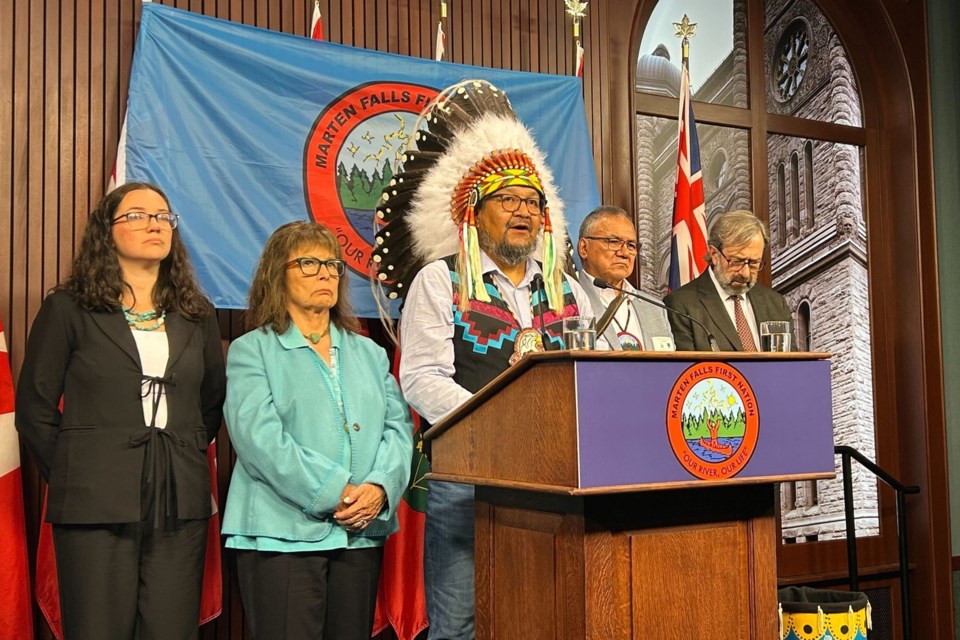TORONTO — An Ontario First Nation that has worked toward road access to the mineral-rich Ring of Fire on its traditional territory is now asking the courts to prevent the provincial and federal governments from mineral development in the region.
Marten Falls First Nation, located about 400 kilometres northeast of Thunder Bay, has filed a statement of claim asking for interim and permanent injunctions preventing Ontario and Canada from funding or participating in mining-related activities in the Ring of Fire.
The claim centres on a series of massive projects between the 1930s and 1950s that the First Nation says diverted river systems on their territory using dams and artificial channels to benefit residents and industry in the southern part of the province and harmed their way of life.
The First Nation now worries that a pair of contentious federal and provincial laws known as Bill C-5 and Bill 5 could be used to push through Ring of Fire development, including hydroelectric projects to serve as a power supply, over environmental concerns.
Chief Bruce Achneepineskum said his people have seen the ill-effects of development on their territory without their consent, with the water diversion destroying fish populations and drying up canoe routes, and they do not want it to happen again.
"Our people have been sickened, physically, emotionally and spiritually, mentally by the Crown's theft of our waters, and now, once again, the governments of Ontario and Canada want to move forward more development, more dams, more mines and more taken from our people," he said Thursday at a press conference.
Bill C-5 allows cabinet to quickly grant federal approvals for big projects deemed to be in the national interest such as mines, ports and pipelines by sidestepping existing laws, while Ontario's bill allows its cabinet to suspend provincial and municipal laws through the creation of so-called "special economic zones."
The laws are designed to override environmental protections and push through development quickly, Achneepineskum said.
"The governments are passing these laws to immunize themselves from accountability, even though they knowingly violate our rights, even when they know that their decisions are causing us harm," he said.
"Well, we are here to say, 'No more.'"
Marten Falls First Nation has been working on environmental assessments for roads that would both connect its community to the provincial highway system and lead to the Ring of Fire.
An Ontario government spokesperson said in a statement that Marten Falls has shown "steadfast support" for the Ring of Fire since 2018.
"We are looking at all options to continue moving this multi-generational project of national significance forward," Erika Robson wrote.
"We remain focused on building consensus with First Nations on shared priorities including all-season roads and resource development, that support long-term prosperity."
Marten Falls' court filing comes just weeks after nine Ontario First Nations launched their own legal challenge to Bill C-5 and Bill 5. The Indigenous communities say the laws represent a "clear and present danger" to the First Nations' self-determination rights to ways of life on their territories.
Despite assurances from both levels of government that Indigenous communities will be consulted, they do not believe consultation will be meaningful and fulfil the governments' obligations to them.
Achneepineskum said his community has so far not been involved in any substantial talks to that end.
"Seemingly, it's the status quo of what happened with the diversion dam projects that we're being overrun, but talked to in a nice way," he said.
When confronted with criticism over Bill 5, Premier Doug Ford has previously hailed Marten Falls, Webequie First Nation and Aroland First Nation as examples of "progressive" communities that want development and the prosperity that comes with it.
But not only is Marten Falls seeking an injunction against it, Aroland was also one of the nine communities to challenge the bill.
This report by The Canadian Press was first published Aug. 7, 2025.
Allison Jones, The Canadian Press




